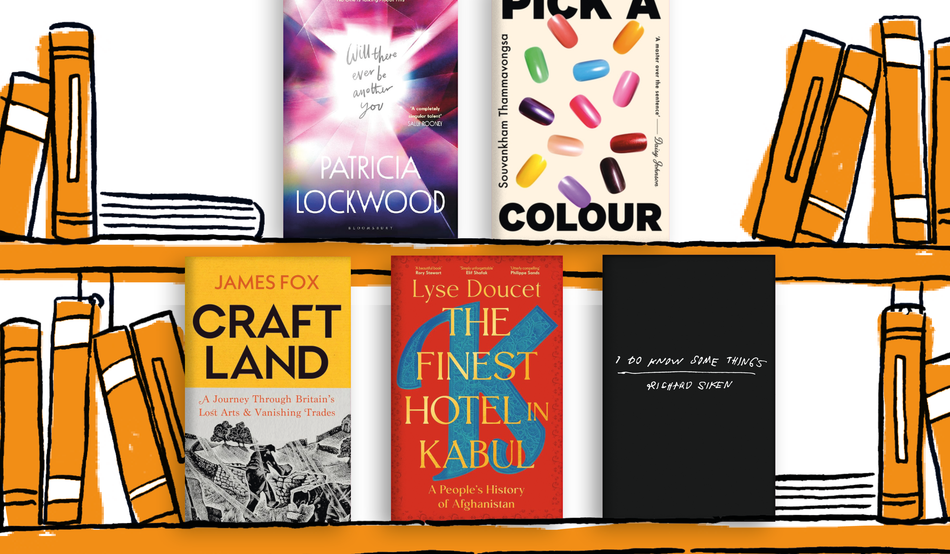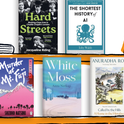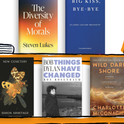Craftland: A Journey Through Britain’s Lost Arts and Vanishing Trades
by James Fox (Bodley Head, £25)
James Fox set out to find the last practitioners of skills that a century ago would have been familiar across Britain. The result, Craftland, turns out to be a sometimes melancholy and elegiac investigation into regional customs and traditions, richly distinctive local vocabularies and ecosystems, and the kind of craftsmanship it takes a patient lifetime to master. It is the story of the collateral human damage of industrial and technological revolution and of 20th-century social changes so rapid that what we have lost can never now be retrieved.
Fox travelled all over the country, talking to dry stone wallers in Yorkshire, woodsmen in the Chilterns, thatchers in Scotland, eel catchers, rush weavers and makers of bells, brushes and baskets. Mostly, he finds they represent the last redoubts of what had once been burgeoning industries employing thousands of people. In mid-19th-century High Wycombe, then famous for furniture making, 150 workshops turned out 4,700 chairs a day. In 1901, there were 63,000 wheelwrights in Britain; in 1951, there were only 3,361; in 2025, fewer than 20.
Many of Fox’s interviewees reflect that their skills will probably die with them. Not many young people are encouraged to enter rarefied crafts like these unless they have been brought up in households imbued with a reverence for them (the mother of one of the last Chilterns coppicers is the region’s last lacemaker) or are taking a conscious stand against the globalised standardisation of modern life.
Steve, a bodger (wood turner) in the Buckinghamshire beechwoods, was inspired by EF Schumacher’s Small is Beautiful. Schumacher once wrote: “Any intelligent fool can make things bigger, more complex, and more violent. It takes a touch of genius – and a lot of courage to move in the opposite direction,” which is a fine description for the men and women Fox meets in these pages. We can only hope it is more than their epitaph.
Lucy Lethbridge
The Finest Hotel in Kabul: A People’s History of Afghanistan
by Lyse Doucet (Hutchinson Heinemann, £25)
If you think this book is about a glamorous, five-star hotel in 1970s Kabul, you are only partly right. The hotel in question—known as the Inter-Continental, though now unaffiliated with the brand—has played constant witness to five decades of oppression and bloodshed. It was also home to Lyse Doucet, the BBC’s chief international correspondent, during her years reporting there. She traces Afghanistan’s fundamental conflict between western influence and authoritarian rule through its corridors.
And so we meet Afghanistan’s answer to Elvis Presley, Ahmad Zahir, serenading guests during the hotel’s “golden years”. We watch as the famous singer Aryana Sayeed plans to perform on a stage once used for Taliban executions, her music “rooted in Afghan culture, while reaching out to a new and much wider world”.
But it is the stories of unsung, ordinary Afghans that carry the narrative forward. Inter-Con staff such as housekeeper Hazrat and engineer Amanullah persevere through hostile governments, donning more traditional clothing and switching out portraits of transient “leaders”. Despite these challenges, warm Afghan hospitality prevails. Chef Abida’s “perfect plump packages of ashak and mantu” serve the reader too with a mouthful of sumptuous plosives.
Then there are the most unsung Afghans of all: Doucet does the important work of archiving the otherwise silenced voices of Afghan women and girls, many of whom are denied literacy under the Taliban today.
Because, whoever’s in charge, the revolving doors of the Inter-Continental Hotel are always open; its attentive staff are always watching—and so, too, is Lyse Doucet.
Sophie Farmer
I Do Know Some Things
by Richard Siken (Copper Canyon Press, £15.99)
If Hollywood ever takes an interest in 21st-century American poetry, my money would be on the life and work of Richard Siken. Rejected by editors for a decade, Crush (2005), his debut, became a sleeper hit with a young online fandom, who memed the doomed queer romance of its most resonant lines—“Sorry about the blood in your mouth. I wish it was mine”—and turned it into an unlikely bestseller.
His long-awaited second collection, War of the Foxes (2015), was a quieter meditation on painting and storytelling. It began to seem possible that Siken would be forever known as the man who wrote Crush. But his third book, another decade later, might just change that. I Do Know Some Things is a sequence of 77 one-paragraph prose poems which flash through a personal saga of such relentless intensity that it feels as likely to win an Oscar as a Pulitzer.
The tragedy that inspired Crush is addressed in “Cover Story” (“He died on Christmas Day, 1990”). But Siken’s intertwined, timeslip structure is really concerned with the autobiographical before-and-after of that book: growing up gay in a dysfunctional family and then, in 2019, suffering a stroke that stripped him of mobility and eloquence.
This is writing as rebuilding, each sentence placed unwaveringly on the page (“I set the margins and surrounded the thoughts on all sides”). Siken is a deadpan virtuoso of the wrongfooting observation, his prose flickering between confessions as he remembers the frightening poetry of pure confusion: “The doctor was handsome and it embarrassed me. For a while, I was talking to a brightness in the corner of the room [...] I said black tree when I meant night.” It’s a spectacular comeback.
Jeremy Noel-Tod
Will There Ever Be Another You
by Patricia Lockwood (Bloomsbury, £16.99)
How to write about something that nobody wants to remember, let alone relive? This is the problem with the pandemic. But how to write about that while also covering the times in which we live? That is, an era when life is online and offline and in-between, where interactions circle around, or are mediated by, our phones.
Patricia Lockwood’s second novel, Will There Ever Be Another You, is an autofictional account of her experience of Covid-induced mania. Like her first novel, No One Is Talking About This, it is surely also one of the most precise renderings of our digital era, if there can be anything like precision about so strange and liminal a thing.
Lockwood’s story encompasses her disorienting experience of illness, parts of her Christian upbringing (her 2017 memoir, Priestdaddy, was a bestseller), TV shows, literature and Wikipedia. There is also the grief, narrated in that debut novel, of her baby niece dying of a rare genetic disorder: this latest book opens with a family trip to Scotland, where her sister misplaces a phone filled with pictures of the child they had lost.
In the next chapter, “The Changeling”, the mania kicks in. “Sometimes she sat at the foot of the illness and asked it questions,” writes Lockwood. “Had it stolen her old mind and given her a new one?” The book itself is experienced like mania, or like reading the internet—small bits making up a whole, remembrances of things you might rather forget.
But it’s all leavened by Lockwood’s singular sense of humour: “She re-tucked her shirt. Nothing that serious, she knew, could be happening to the body of a person wearing a Looney Tunes T-shirt.”
Alona Ferber
Pick a Colour
by Souvankham Thammavongsa (Bloomsbury, £12.99)
In the eyes of Souvankham Thammavongsa’s narrator, Ning, “everyone is ugly”—a claim she makes in Pick a Colour’s first line. “I should know,” she insists: her working life is spent manicuring, pedicuring, threading and waxing, aka monetising other people’s physical imperfections. More kinds of “ugliness” reveal themselves, too. Over the course of one day, the nail salon she runs becomes a stage for the full range of human misdemeanour.
The Laotian-Canadian author makes cynicism Ning’s defining trait in what is a shrewd, carefully observed character study. Her previous work in the short story genre—winning the O Henry Award and the Giller Prize—painted crisp portraits of the lives of Laotian immigrants in Canada. This debut novel explores similar terrain, its subject the near invisibility of migrant workers.
Ning deliberately augments that anonymity. Her embittered employees share the same haircut and, knowing customers would mispronounce their actual names, all wear “Susan” nametags. As work grinds on and clients divulge their most pent-up secrets, the Susans act as a kind of catty Greek chorus. They openly mock customers’ bodies, flaws and privileges, from behind the safety of the language barrier.
For the 41-year-old, single protagonist, her clients’ confidences also serve as wounding reminders of her own squandered potential. The novel does not go deep into Ning’s backstory as a former boxing pro, retired in disgrace. (Pointedly, Ning is also mysteriously missing her ring finger.) There is the sense that the narrator withholds as much from the reader as from those around her.
But we catch glimpses, through the manicurist’s hardened exterior, of her more optimistic core—making the nail salon an unlikely setting for poignant ruminations about love and loss. As Ning notes towards the end, “people who get their nails done are hopeful. They think things can change.”
Miriam Balanescu












